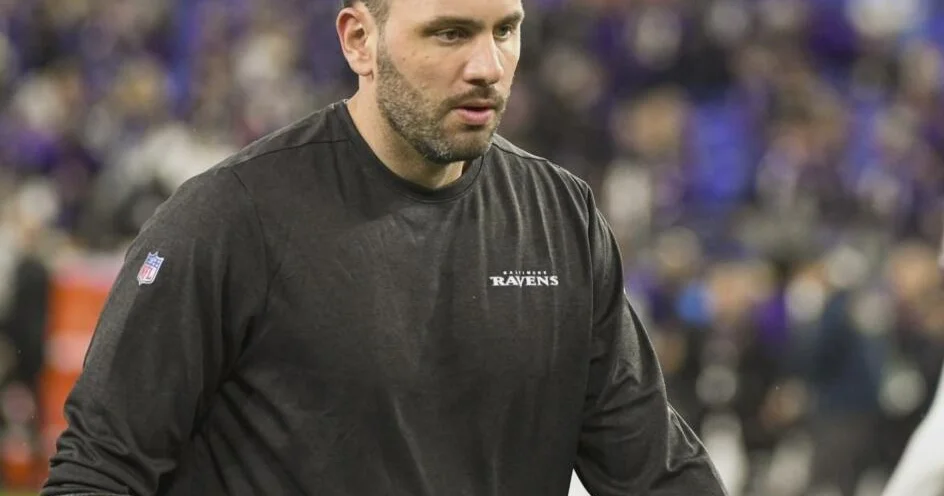The former coach of the Baltimore Ravens enters a not guilty plea to identity theft and improper computer access.
In a recent high-profile legal case, Matt Weiss, a former assistant coach for the Baltimore Ravens and the University of Michigan, has entered a plea of not guilty to charges of unauthorized computer access and identity theft. The case has drawn widespread attention due to its implications for cybersecurity in collegiate and professional sports, as well as the legal ramifications of digital privacy violations. This article delves into the details of the indictment, Weiss’s legal defense, the broader context of identity theft in the digital era, and the potential consequences he may face.
Background of Matt Weiss Matt Weiss built a career in football coaching, making a name for himself as a dedicated strategist and mentor. He worked with the Baltimore Ravens from 2009 to 2020, serving in various coaching roles before joining the University of Michigan as an assistant coach in 2021. Weiss was regarded as a rising star in the industry, known for his analytical approach to the game. However, his career came to an abrupt halt in early 2023 when allegations of unauthorized computer access led to his dismissal from Michigan’s coaching staff.
Details of the Charges The indictment alleges that between 2015 and early 2023, Weiss illegally accessed computer systems containing sensitive personal and medical data of athletes across the country. According to prosecutors, Weiss exploited security vulnerabilities in databases maintained by Keffer Development Services, a third-party company that manages digital records for collegiate sports programs. His alleged actions reportedly involved obtaining access to thousands of accounts, with a particular focus on female athletes.
Court documents state that Weiss used compromised credentials to infiltrate the databases, extracting personal photos, medical histories, and other confidential information. It is alleged that he then stored this data on private devices, though authorities have not yet disclosed whether the information was distributed or used for financial gain.
The Legal Proceedings Weiss was first questioned by authorities in early 2023 when unusual access patterns were detected in university and vendor systems. After failing to cooperate with internal investigations, he was dismissed from the University of Michigan and later indicted on federal charges. At his arraignment in Detroit, Weiss pleaded not guilty to all counts, maintaining that he had not engaged in any illegal activities.
His defense team argues that the case lacks direct evidence linking Weiss to malicious intent. They claim that his access to the systems was accidental or the result of professional curiosity rather than criminal activity. However, prosecutors have presented digital footprints that suggest a deliberate attempt to bypass security measures and access restricted data.
The Civil Lawsuit and Repercussions for the University of Michigan In addition to the federal indictment, Weiss faces a civil lawsuit filed by two former University of Michigan athletes, a gymnast and a soccer player. The lawsuit alleges that the university failed to monitor and supervise Weiss’s activities adequately, thereby enabling the privacy breach. The plaintiffs seek damages for emotional distress and reputational harm, arguing that their personal information was unlawfully accessed.
The University of Michigan has responded by emphasizing its commitment to cybersecurity and data protection. The institution has launched an internal review of its digital security protocols and pledged to implement stricter measures to prevent similar incidents in the future.
Cybersecurity Challenges in Sports Organizations This case highlights the growing cybersecurity challenges in the sports industry, particularly regarding the protection of athlete data. Collegiate and professional teams collect vast amounts of personal information, including biometric data, health records, and contractual details. Without robust cybersecurity measures, these records can become targets for hackers and unauthorized users.
Experts suggest that sports organizations should invest in enhanced encryption protocols, two-factor authentication, and employee training programs to mitigate cyber risks. The Weiss case serves as a stark reminder that even trusted insiders can pose security threats, making continuous monitoring and auditing essential.
Potential Consequences for Weiss If convicted, Weiss could face severe penalties under federal law. Unauthorized computer access carries a potential sentence of up to five years per count, while aggravated identity theft mandates a minimum two-year sentence for each offense. Given the scale of the alleged violations, legal analysts speculate that Weiss could be looking at a lengthy prison term if found guilty.
In addition to criminal penalties, a conviction would likely result in irreparable damage to Weiss’s career. The National Collegiate Athletic Association (NCAA) and the National Football League (NFL) have strict policies regarding ethical conduct, and a conviction would likely prevent Weiss from securing future coaching positions.
Broader Implications for Identity Theft and Digital Privacy The case against Weiss also underscores the broader issue of identity theft and digital privacy in modern society. With increasing reliance on digital platforms, personal data breaches have become a common threat. High-profile cases like this one draw attention to the need for stronger cybersecurity legislation and enforcement.
Lawmakers and industry leaders continue to debate the best strategies for protecting digital information. Some advocate for stricter penalties for cybercrimes, while others emphasize the importance of preventive measures such as ethical hacking initiatives and security awareness programs. Regardless of the approach, the Weiss case reinforces the need for vigilance in digital security practices.
Matt Weiss’s legal battle is far from over, with upcoming court proceedings set to determine his fate. His plea of not guilty sets the stage for a complex trial that will likely involve extensive digital forensic analysis and expert testimonies on cybersecurity. Whether Weiss is ultimately convicted or acquitted, his case serves as a cautionary tale about the risks of unauthorized digital access and the importance of safeguarding sensitive data.
For the sports industry and beyond, this incident is a wake-up call to the growing dangers of cybercrime. As technology continues to evolve, organizations and individuals must prioritize digital security to prevent similar breaches and protect personal information from exploitation.



